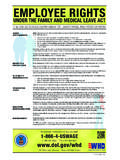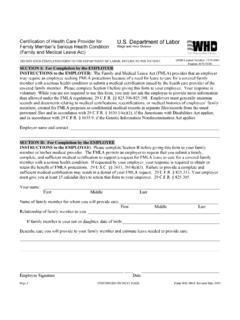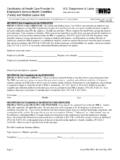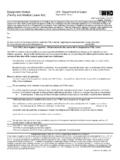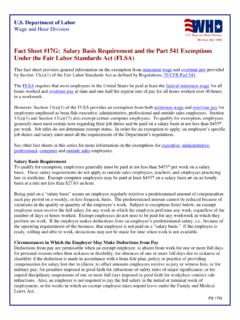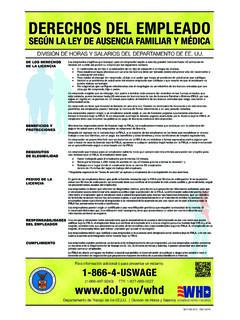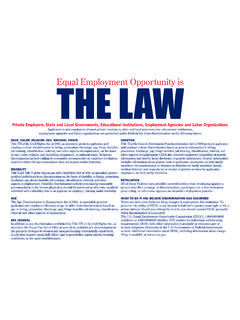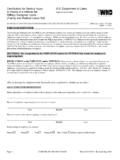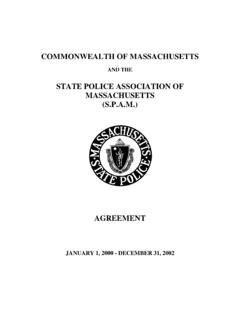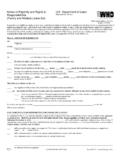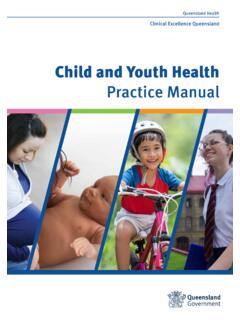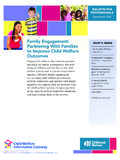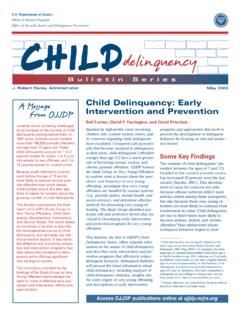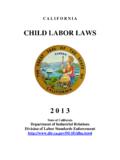Transcription of Child Labor Provisions of the Fair Labor Standards Act ...
1 Department of Labor Wage and Hour Division (December 2016) Child Labor Provisions of the Fair Labor Standards Act (FLSA) for Nonagricultural Occupations This Fact Sheet provides general information about the Federal youth employment Provisions applicable to nonagricultural occupations. Different Standards apply to farm work. The Department of Labor is committed to helping young workers find those positive and early employment experiences that can be so important to their development, but the work must be safe. The youth employment Provisions of the FLSA were enacted to ensure that when young people work, the work does not jeopardize their health, well-being or educational opportunities.
2 Employers are subject to the youth employment Provisions generally under the same coverage criteria as established for the other Provisions of the FLSA. It is an unfortunate fact that children do get injured, even killed, in the workplace. The National Institute for Occupational Safety and Health estimates that 160,000 American children suffer occupational injuries every year and 54,800 of these injuries are serious enough to warrant emergency room treatment. Both Federal and State laws govern the employment of young workers and when both are applicable, the law with the stricter standard must be obeyed. The Federal youth employment Provisions do not: require minors to obtain "working papers" or "work permits," though many States do; restrict the number of hours or times of day that workers 16 years of age and older may be employed, though many States do; apply where no FLSA employment relationship exists; regulate or require such things as breaks, meal periods, or fringe benefits; regulate such issues as discrimination, harassment, verbal or physical abuse, or morality, though other Federal and State laws may.
3 Minimum Age Standards For Employment The FLSA and the youth employment regulations issued at 29 CFR, Part 570, establish both hours and occupational Standards for youth . Children of any age are generally permitted to work for businesses entirely owned by their parents, except those under age FS 43 16 may not be employed in mining or manufacturing and no one under 18 may be employed in any occupation the Secretary of Labor has declared to be hazardous. 18 Once a youth reaches 18 years of age, he or she is no longer subject to the Federal youth employment Provisions . 16 Basic minimum age for employment. Sixteen- and 17-year-olds may be employed for unlimited hours in any occupation other than those declared hazardous by the Secretary of Labor .
4 14 Young persons 14 and 15 years of age may be employed outside school hours in a variety of non-manufacturing and non-hazardous jobs for limited periods of time and under specified conditions. Under Children under 14 years of age may not be employed in non-agricultural 14 occupations covered by the FLSA. Permissible employment for such children is limited to work that is exempt from the FLSA (such as delivering newspapers to the consumer and acting). Children may also perform work not covered by the FLSA such as completing minor chores around private homes or casual baby-sitting. OCCUPATIONS BANNED FOR ALL MINORS UNDER THE AGE OF 18 The Hazardous Occupations Orders (HO) The FLSA establishes an 18-year minimum age for those nonagricultural occupations that the Secretary of Labor finds and declares to be particularly hazardous for 16- and 17-year-old minors, or detrimental to their health or well-being.
5 In addition, Child Labor Regulation No. 3 also bans 14- and 15-year-olds from performing any work proscribed by the HOs. There are currently 17 HOs which include a partial or total ban on the occupations or industries they cover. HO 1. Manufacturing or storing explosives bans minors working where explosives are manufactured or stored, but permits work in retail stores selling ammunition, gun shops, trap and skeet ranges, and police stations. HO 2. Driving a motor vehicle or work as an outside helper on motor vehicles bans operating motor vehicles on public roads and working as outside helpers on motor vehicles, except 17-year-olds may drive cars or small trucks during daylight hours for limited times and under strictly limited circumstances (see Fact Sheet #34 in this series for information about on-the-job driving).
6 HO 3. Coal mining bans most jobs in coal mining. HO 4. Occupations in forest fire fighting, forest fire prevention, timber tract, forestry service, and occupations in logging and sawmilling operations bans most jobs in: forest fire fighting; forest fire prevention that entails extinguishing an actual fire; timber tract management; forestry services; logging; and sawmills. HO 5. Power-driven woodworking machines bans the operation of most power-driven woodworking machines, including chain saws, nailing machines, and sanders.* HO 6. Exposure to radioactive substances and ionizing radiation bans employment of minors where they are exposed to radioactive materials. HO 7. Power-driven hoisting apparatus bans operating, riding on, and assisting in the operation of most power-driven hoisting apparatus such as forklifts, non-automatic elevators, skid-steers, skid-steer loaders, backhoes, manlifts, scissor lifts, cherry pickers, work-assist platforms, boom trucks, and cranes.
7 Does not apply to chair-lifts at ski resorts or electric and pneumatic lifts used to raise cars in garages and gasoline service stations. HO 8. Power-driven metal-forming, punching and shearing machines bans the operation of certain power-driven metal-working machines but permits the use of most machine tools.* HO 9. Mining, other than coal bans most jobs in mining at metal mines, quarries, aggregate mines, and other mining sites including underground work in mines, work in or about open cut mines, open quarries, and sand and gravel operations. HO 10. Power-driven meat-processing machines, slaughtering and meat packing plants bans the operation of power-driven meat processing machines, such as meat slicers, saws and meat choppers, wherever used (including restaurants and delicatessens).
8 Also prohibits minors from cleaning such equipment, including the hand-washing of the disassembled machine parts. This ban also includes the use of this machinery on items other than meat, such as cheese and vegetables. HO 10 also bans most jobs in meat and poultry slaughtering, processing, rendering, and packing establishments.* HO 11. Power-driven bakery machines bans the operation of power-driven bakery machines such as vertical dough and batter mixers; dough rollers, rounders, dividers, and sheeters; and cookie or cracker machines. Permits 16- and 17-year-olds to operate certain lightweight, small, portable, counter-top mixers and certain pizza dough rollers under certain conditions.
9 HO 12. Balers, compactors, and power-driven paper-products machines bans the operation of all compactors and balers and certain power-driven paper products machines such as platen-type printing presses and envelope die cutting presses. Sixteen- and 17-year-olds may load, but not operate or unload, certain scrap paper balers and paper box compactors under very specific guidelines (see Fact Sheet #57). * HO 13. Manufacturing of brick, tile and related products bans most jobs in the manufacture of brick, tile and similar products. HO 14. Power-driven circular saws, band saws, guillotine shears, chain saws, reciprocating saws, wood chippers, and abrasive cutting discs bans the operation of, and working as a helper on, the named types of power-driven equipment, no matter what kind of items are being cut by the equipment.
10 * HO 15. Wrecking, demolition, and ship-breaking operations bans most jobs in wrecking, demolition, and ship-breaking operations, but does not apply to remodeling or repair work which is not extensive. HO 16. Roofing operations and work performed on or about a roof bans most jobs in roofing operations, including work performed on the ground and removal of the old roof, and all work on or about a roof* (see Fact Sheet #74) HO 17. Trenching and excavation operations bans most jobs in trenching and excavation work, including working in a trench more than four feet deep.* *The regulations provide a limited exemption from HOs 5, 8, 10, 12, 14, 16 and 17 for apprentices and student-learners who are at least 16 years of age and enrolled in approved programs.
